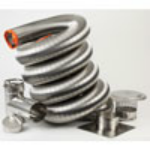
It’s very common that the chimney that vents your gas or oil furnace, boiler, or water heater will need to be relined. The exhaust that these appliances produce is corrosive and breaks down the original masonry lining over time. Switching fuels from oil to gas accelerates this process. Another reason this chimney may need to be relined is because the newer heating appliances are more efficient than the older appliances that the chimney was originally intended to vent. More efficient appliances mean you get more heat and less heat goes up the chimney, so a smaller sized liner would need to be installed to properly vent your appliances.
- A properly sized UL 1777 listed lining system with all the required components needs to be installed, not just a “liner”
- A manufacturer’s transferable lifetime warranty
- The installer should be certified by the Chimney Safety Institute of America (some warranties even require an annual inspection by a CSIA Certified Sweep)
- The installer should have some specific training in relining chimneys, such as the CSIA’s “Lining Masonry Chimneys with Stainless Steel” class
- The installing company should have proper insurance
- The installing company is required to have a valid Pennsylvania Home Improvement Contractor (HIC) license
Lou Curley’s Chimney Service meets this criteria, many companies that reline chimneys (this includes heater guys and chimney sweeps) do not.
